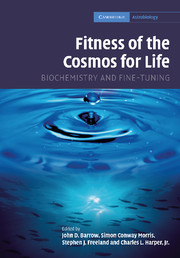Book contents
- Frontmatter
- Contents
- List of contributors
- Foreword: The improbability of life
- Preface
- Acknowledgments
- Part I The fitness of “fitness”: Henderson in context
- Part II The fitness of the cosmic environment
- Part III The fitness of the terrestrial environment
- Part IV The fitness of the chemical environment
- Index
Foreword: The improbability of life
Published online by Cambridge University Press: 18 December 2009
- Frontmatter
- Contents
- List of contributors
- Foreword: The improbability of life
- Preface
- Acknowledgments
- Part I The fitness of “fitness”: Henderson in context
- Part II The fitness of the cosmic environment
- Part III The fitness of the terrestrial environment
- Part IV The fitness of the chemical environment
- Index
Summary
How did life begin?
I (and most scientists) would answer, “By accident.” But what an absolutely unlikely accident it must have been! The earth on which life first appeared – prebiotic earth – was most inhospitable: a violent place, wracked by storms and volcanoes, wrenched by the pull of a moon that was much closer than the one we know now, still battered by cosmic impacts. On its surface and in its oceans were myriads of organic compounds, some formed in processes occurring on earth, some imported by infalls from space. Out of this universe of tumult and molecules, somehow a small subset of chemical processes emerged and accidentally replicated, thus stumbling toward what became the first cells. How could such a chaotic mixture of molecules have generated cells? Order usually decays toward disorder: Why do the tracks that led to life point in the opposite direction?
The origin of life is one of the biggest of the big questions about the nature of existence. Origin tends to occur frequently in these big questions: the origin of the universe, the origin of matter, the origin of life, the origin of sentience. We, scientists and non-scientists alike, have troubles with such “origins” – we were not there watching when the first events happened, we can never replicate them, and, when those first events happened, there was, in fact, no “we.”
- Type
- Chapter
- Information
- Fitness of the Cosmos for LifeBiochemistry and Fine-Tuning, pp. xi - xxPublisher: Cambridge University PressPrint publication year: 2007

